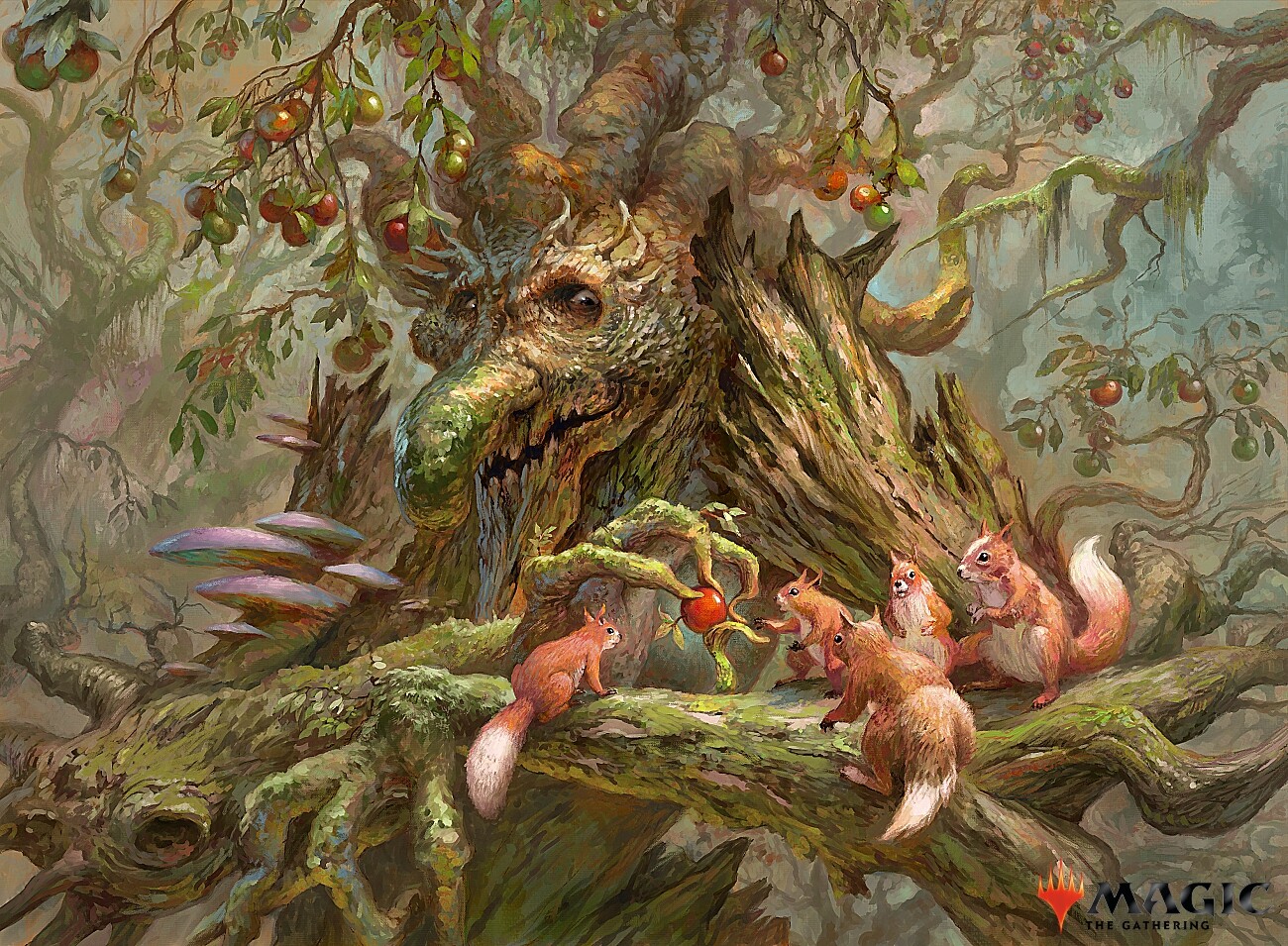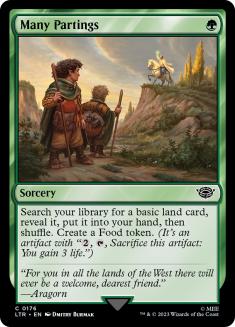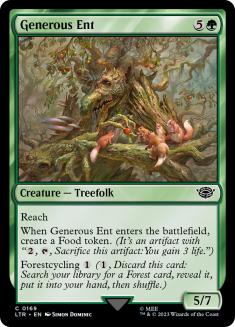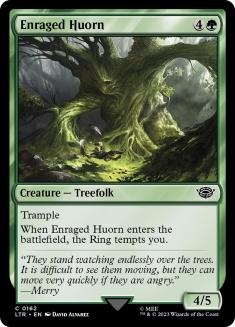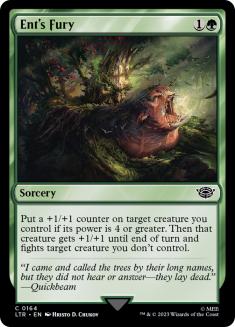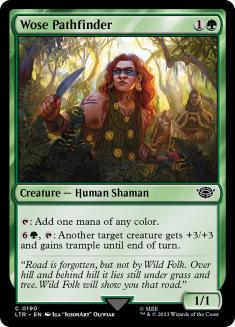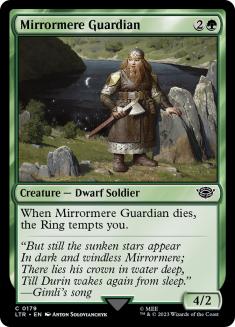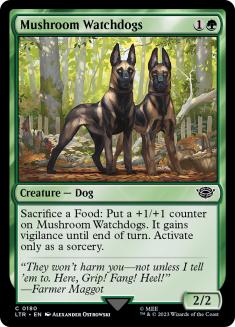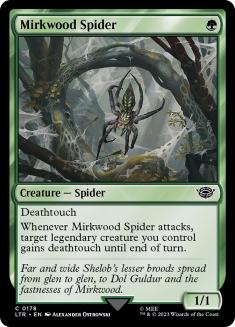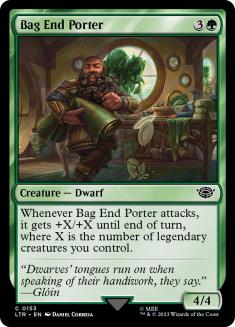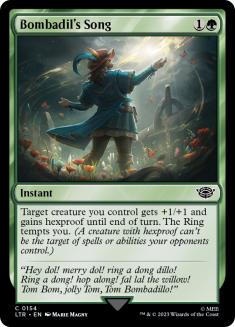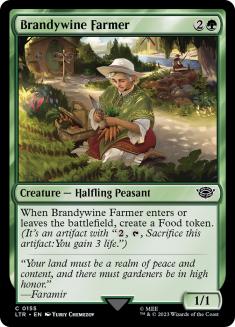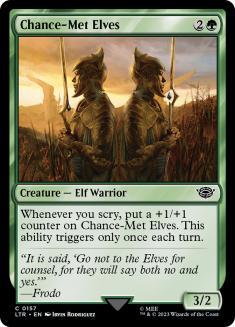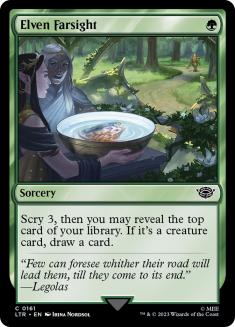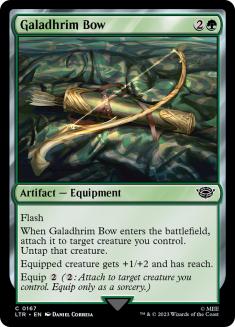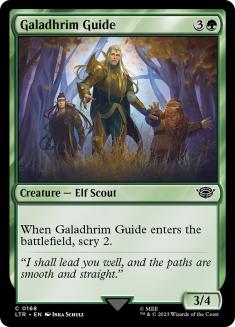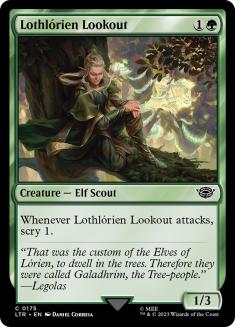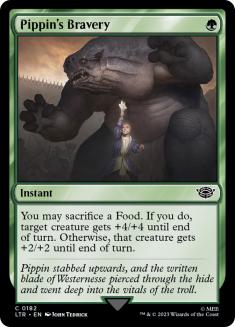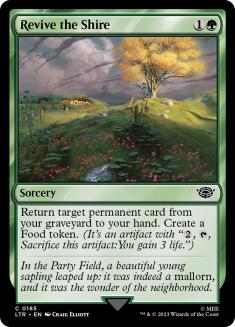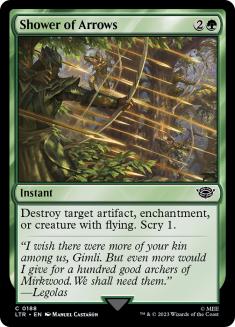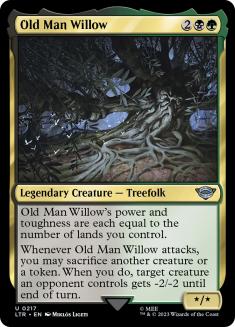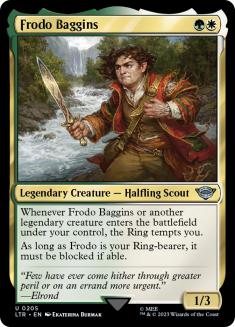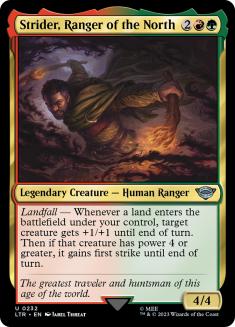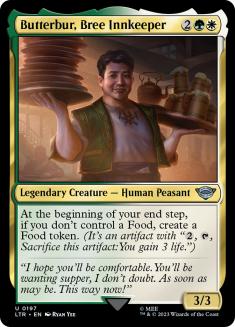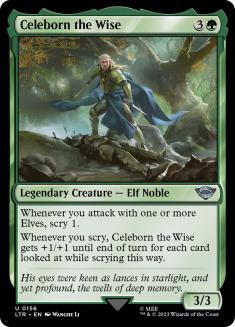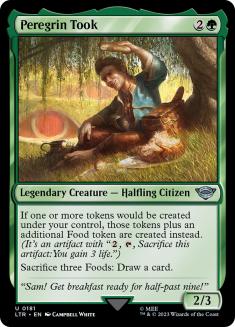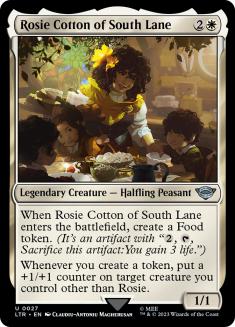After some time playing The Lord of the Rings: Tales of Middle-earth Limited, it has become obvious to most players is that green is the least powerful color. While I also share this view, it doesn’t mean the color is unplayable. Sure, green is the shallowest color, with some very underwhelming cards – but the strong cards are still strong. We’re at the point in the format where the average drafter is fairly averse to taking green cards, which provides an opportunity.
Let’s start by taking a look at the green commons.
Best Green Commons
I’ve got Many Partings pegged for the best green common currently. While unimpressive at face value, it has many practical applications. Most obviously, it will enable splashes, which opens up some doors during the draft, assuming you’re moving into green. In most two- and three-color green decks, this also can take a land slot in your deck, treating it as an enters-the-battlefield-tapped land.
Second, it helps thin your deck. It also is a spell that triggers cards like Fiery Inscription, or fills your graveyard for a splashed Gandalf’s Sanction (more on that later). Lastly, it leaves behind a Food token, with one of the most obvious synergies being Mushroom Watchdogs. It’s a lot of tiny things packed into one mana, making it a versatile card.
Generous Ent could very well be the best of the one-mana landcyclers. As green often ends up being a slower deck, this can be a strong stabilizing creature. The combination of stats, reach, and a Food token help green turn the corner from stabilizing to attacking.
Enraged Huorn is the most underrated green common in my opinion. While it doesn’t have all the bells and whistles compared to something like Stalwarts of Osgiliath, it makes up for that in size and, most importantly, trample. Often green has an issue clearing through chump-blocking tokens, but not here.
Green also lacks cards with “the Ring tempts you”, making Enraged Huorn the best card to fill that slot. It also makes for a great Ring-bearer; five toughness makes it difficult to kill during combat if you want to rummage, and trample can become threatening very quickly if your Ring is at Level 4.
With green being one of the slowest colors, the power of Ent’s Fury is relative to your mid-game combatants. This card is at its best late-game, giving +2/+2 to something like Enraged Huorn, killing a creature, and making a big attack. Green doesn’t offer the best brawlers until at least Turn 3, so I recommend evaluating it as a mid- to late-game kill spell instead of comparing it to something like Smite the Deathless.
Wose Pathfinder is the most potent way to speed up a traditionally slow deck. The Pathfinder can also help fix your mana, though it can be unreliable for that purpose, as it often dies after being cast on Turn 2. The second ability comes up far more often than I would have guessed initially, making blocks difficult as well as threatening lethal via trample during the late-game.
Mid-Tier Green Commons
The main downside is that Mirrormere Guardian doesn’t do a great job at guarding two-drops, and often trades down. When the battlefield lines up nicely, this can be a potent threat or great blocker. Mirrormere Guardian is the only other green common besides Enraged Huorn with “the Ring tempts you”.
More often than not, Mushroom Watchdogs ends up being a Runeclaw Bear, which is actually surprisingly decent in green decks. Other times, these Dogs can take over a game in short order. If you’re able to keep a steady supply of kibbles and bits coming, Mushroom Watchdogs can get out of kill range quickly, acting as a potent threat and blocker due to vigilance.
Low-Tier Green Commons
The decks where I don’t mind Mirkwood Spider are very slow. The attack trigger comes up rarely, yet can be relevant. I mostly look to this Spider if I’m in need of some speed bumps.
Bag End Porter can be fine in some decks that need a potent attacker. It’s a bit slow for your average green deck that will often be looking to stabilize. If your curve needs some four-drops, I’m fine throwing a Porter in there.
Unplayable Green Commons
There are some spots for some of these cards, but these are not cards you should be taking outside of Picks 10-14.
Uncommons Worth Splashing
Two of the most powerful green uncommons, Old Man Willow and Frodo Baggins, can merit splashing green to play them. Rise of the Witch-king; Arwen Undomiel; Strider, Ranger of the North; and Friendly Rivalry all have potential to be strong, but require support from your deck to reach their potential.
Green Combos
My initial combos/synergies article highlighted very few green cards, mostly because they weren’t as powerful or prevalent as others. I’ve got a few cool synergies within the color I’m happy to share:
Turn 4 Porter into Turn 5 Strider + landfall trigger allows you to attack with a 6/6 first striker.
Butterbur can assure that your Dogs will be so well-fed, there won’t be mushroom for second breakfast.
The classic deathtouch + trample combination that can end games. Mirkwood Spider can also give a much bigger legendary creature deathtouch, creating a decent Thorn Elemental impression.
Mirrormere Guardian is green’s best brawler by Turn 3. A 6/4 after the +1/+1 counter and further +1/+1 temporary bonus will have its hand raised against most early-game creatures in a fight.
I’m secure enough to admit I’ve lost to this combination before. The 1/3 stat line allows the Lookout to attack freely during the first few turns, and can continue to do so if it becomes a Ring-bearer. A three-mana 4/3 isn’t all that exciting, but if left unchecked, Chance-Met Elves can get out of hand quickly.
While I mostly view Celeborn the Wise as strictly unplayable, combined with Elven Farsight, it’s… still probably unplayable. However, it gets huge!
Peregrin Took has largely been unimpressive, as a bonus Food token here or there doesn’t do much. In combination with Rosie, you can immediately grow the Took into a 4/5 and likely draw a card with another Food.
Green in Action
Below are some examples of successful green decks:
My current approach with green has been jumping into it mid- to late-Pack 1, when other colors seem too contested. If green is contested, I still largely avoid it – but let’s be real, it’s very rarely contested at this point. There’s still plenty to explore with the color, and I encourage you to give it a try!
Lose and Learn, Learn and Win!

